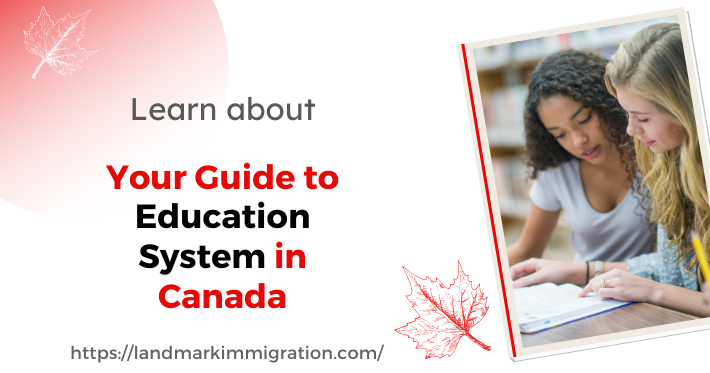Your Guide to Education System in Canada
Canada is one of the largest countries by area. The country boasts beautiful flora and fauna that spans three territories and ten provinces. Canada spans from the Arctic Ocean into the Pacific Ocean and all the way over to the Atlantic Ocean.
However, it is not just the country’s beauty that helps it excel worldwide. The Canadian education system is one of the best in the world. The country has a highly robust public education system which is well-funded.
The government puts a lot of emphasis on the education system and it is constantly being advanced. Let us take a look at the education system in Canada in detail:
How is the education system in Canada?
The
Canadian government is highly focused on the education system in the country. Canadian children attend kindergarten for up to two years when they are around five years of age.
Based on the province you live in, schools may provide education until the 12th grade or 11th in some cases. Students are approximately 16 years of age by the time they graduate from school. After finishing school, children can opt to continue their higher education and enroll in colleges or universities.
What is the structure of the education system in Canada?
Even though the education system in Canada is different in each province, usually Canadian children are mandated to attend school till they turn 16 years of age or until they graduate. In some provinces, students must attend school until they turn 18. Schooling in Canada is divided into four levels, these are:
Pre-elementary
Kindergarten or pre-elementary schooling is the initial stage in the Canadian education system. This is provided for toddlers who are four to five years of age. Pre-elementary school is focused on preparing them for elementary school.
In the provinces of Nova Scotia and New Brunswick, attending pre-elementary school is compulsory. Pre-elementary schooling is provided by federal, private, and public schools. It is the choice of the parents where they wish their child to attend this schooling.
Primary
An elementary or primary school in Canada is compulsory for children between the ages of 6 to 7, to 11 or 12 years. The education starts in the first grade and goes on till the 6th grade. During primary schooling,
Canadian students have one teacher that focuses on teaching them various subjects in one classroom.
Generally, the subjects covered in primary education are art, physical education, social studies, music, science, history, math, reading, and French or the English language. As students keep completing their grades, the level of their education advances.
Junior High School
Junior high school is a part of Secondary education in Canada. It is also commonly known as intermediate education. This stage includes the 8th and the 7th grade.
This stage offers students the opportunity to get well-adjusted to changing teachers and multiple classes during their school day.
The objective is to enable students to be well-prepared for the following stages of education. Naturally, the difficulty level of courses increases with the grade.
High School
High school is the final stage that makes up secondary education in Canada. Students enter high school in the eighth grade and stay for the next four years. Whether high school continues until the 12th or the 11th grade depends on the province.
By Canadian law, students need to attend school until they reach 16 years of age. In the province of New Brunswick and Ontario, students need to be in school until they turn 18 years of age or graduate high school.
In the province of Quebec, secondary education is deemed complete at the 11th grade. This is usually followed by a pre-university course that lasts for two years called the Cegep. Some provinces in Canada provide job training to their high school students.
Post-Secondary Education
After students earn their high school diplomas in Canada, they can choose to apply for higher education in academic institutes like universities and colleges. Higher educational organizations in Canada include trade schools, community colleges, colleges, and universities.
A lot of students attend colleges and earn the credits they require to transfer to a university.
Academic organizations in Canada offer degrees in a lot of different subjects to their graduates. Students can choose if they would like to pursue a diploma, certificate, bachelor’s, PhD, or Master's in the field of their choice.
Is obtaining education in Canada free of charge?
Even though the Canadian education system consists of various levels, public education in the country is entirely free of charge. Based on the province where children attend school, they can study utterly free until the 11th or the 12th standard.
However, international students in Canada are required to pay tuition fees. Many educational institutes in Canada subsidize their tuition fees to enable students from various backgrounds to obtain higher education equally. This subsidy is particularly useful for students who wish to enroll in higher educational institutes.
Conclusion
The education system in Canada is one of the best in the world. That's why many people prefer to
study in Canada. The Canadian government takes care of its citizens and focuses on providing children with the education they need.
The curriculum in Canadian academic organizations is frequently updated to ensure that it is relevant to the demands of the job industry. In terms of higher education, the country offers various kinds of academic institutes that students can attend to advance their education.

